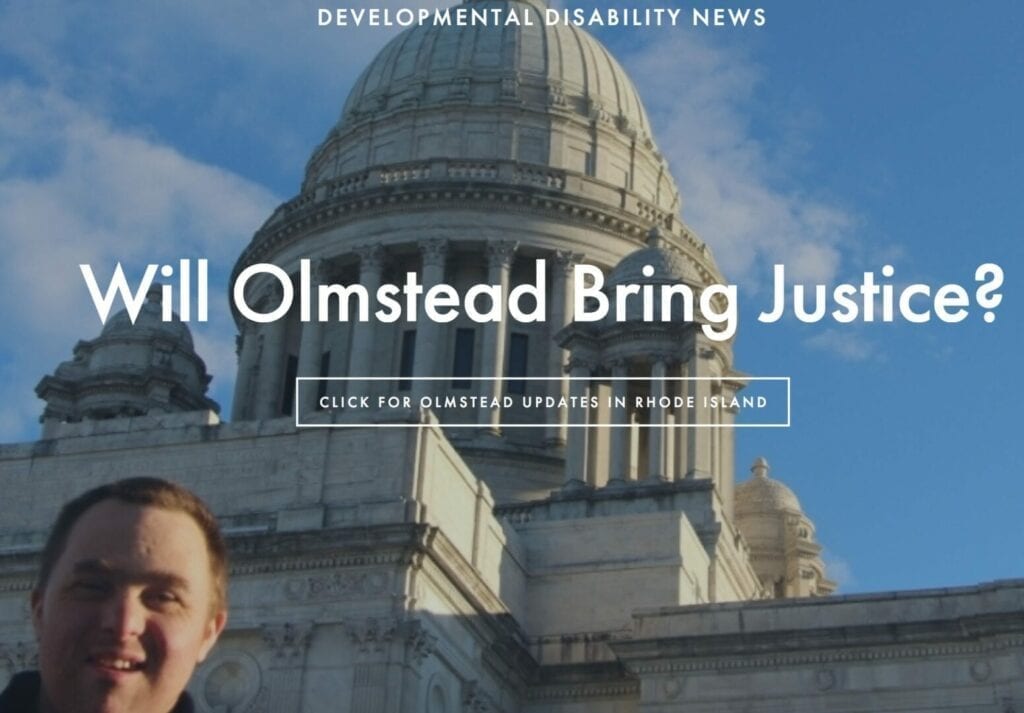Search Posts
Recent Posts
- Outdoors in RI: Help keep recreation areas clean. Invasive Milfoil, trash. 2A update – Jeff Gross July 26, 2024
- Real Estate in RI: Highest-ever sale in Queen’s Grant, EG $1.25M, by Residential Properties July 26, 2024
- Homeless in RI: Gov. Newsom issues Executive Order. Remove California’s encampments. July 26, 2024
- Let the games begin. XXXIII Summer Olympics – John Cardullo July 26, 2024
- GriefSPEAK: What would you do? – Mari Dias Nardolillo July 26, 2024
Categories
Subscribe!
Thanks for subscribing! Please check your email for further instructions.

Developmental Disability News: Governor budgets $510.6M for needed RI DD services – Gina Macris
By Gina Macris, Developmental Disability News
In a budget plan largely driven by the federal court, Rhode Island Governor Dan McKee has proposed $510.6 million in overall developmental disabilities spending for the fiscal year beginning July 1, about $41.5 million more than the General Assembly enacted for the current fiscal year.
Roughly 55 percent, about $283.4 million, of the proposed developmental disabilities budget would be reimbursed by the the federal-state Medicaid program.
At the same time, McKee seeks to close a projected deficit of $28.3 million in the current budget of $469.1 million as the state tries to integrate adults with developmental disabilities into their communities to comply with a 2014 consent decree with the Department of Justice (DOJ).
Much of the shortfall reflects upward cost adjustments made by the Caseload Estimating Conference (CEC), a budget-planning panel which meets twice a year, advising the governor in November and the General Assembly in May.
McKee also would add $2.9 million to the current budget, and $1.1 million in the next one, for “conflict-free case management,” not only to adhere to Medicaid regulations but to comply with the consent decree. Almost all that funding would come from the federal government.
State social workers from the Division of Disabilities will be assigned to check in monthly with those receiving services and their families to determine if their needs are being met, according to a BHDDH spokesman.
It is not clear whether – or how – this arrangement meets the expectations of an independent court monitor overseeing the consent decree changes. The monitor, A. Anthony Antosh, hasn’t issued a report since last August. Antosh has called for “independent facilitators” to help each individual develop a purposeful program of services and to keep track of how the plan works out.
Developmental disabilities programs account for more than $7 out of every $10 spent at the Department of Behavioral Healthcare, Developmental Disabilities and Hospitals (BHDDH), which would get a total of $706.3 million in McKee’s proposal. McKee’s proposed budget for all state spending in the new fiscal year is nearly $13.7 billion.

The latest proposal represents nearly a third more funding for developmental disabilities than the $339.3 million the General Assembly approved just three years ago, in the spring of 2021.
Much of the investment, in recent years, has been used to hike wages for caregivers and their supervisors, for education and training, and for the development of innovative approaches to supporting adults with developmental disabilities.
In three steps since July, 2021, the state has raised the pay for direct care workers by about 49 percent, from $13.18 an hour to a minimum of $20 an hour, in keeping with orders from Chief Judge John J. McConnell of the U.S. District Court, who has been monitoring the state’s efforts to meet the requirements of the consent decree since 2016.
McConnell found that, apart from the impact of the Covid-19 pandemic, historically depressed wages had led to an exodus of workers that prevented the state from offering employment and other services in the community as promised in a 2014 consent decree.
Beginning last July, the $20 minimum hourly rate for workers has been wrapped into a new reimbursement system for private agencies intended to accurately evaluate the needs of individuals, allow them bigger spending limits to get employment and other supports, and to implement administrative changes promoting integration in the community.
The ultimate impact of higher funding on the lives of adults with developmental disabilities remains to be seen. A decade after the state adopted an “Employment First” policy as part of the consent decree, the governor’s figures say that 24.8 percent of the population protected by the consent decree is working in the community, far short of the target 73 percent.
In November, BHDDH told the CEC that private service providers still don’t have the number of workers they need to offer employment-related services and community-based supports for all who want them. A BHDDH report called the shortage “critical.”
Still, the state’s eye-opening investment in historically underfunded services during the last few years has begun to show results. While a big staff shortage remains, private agencies are beginning to see improvement in their ability to attract new workers.
The recent pay hikes, along with support from a statewide workforce initiative, helped private providers add 274 direct support staff between January and September of 2023, BHDDH officials reported in November.
McKee’s proposal for Fiscal Year 2025, which begins this July, includes nearly $462.4 million in reimbursements to the three dozen private agencies, or subcontractors, who serve as the backbone of the service system the state relies on to carry out the requirements of the 2014 consent decree.
These reimbursements also cover the cost of one-person programs managed by so-called “self-directed” individuals or families. The number of self-directed programs has grown to more than a quarter of the caseload of about 4,000 persons, in part because of the staff shortage at private agencies. Individuals and families, however, report the same kinds of problems finding qualified caregivers as the agencies, especially when it comes to securing employment-related services.
A separate line in the budget would allocate $15.6 million for other costs related to private services, according to a spokesman for the state Department of Behavioral Healthcare, Developmental Disabilities and Hospitals (BHDDH).
These expenses include the salaries of state social workers and administrators assigned to clients of the private providers, as well as human resources support, building maintenance, information technology support, and contracts for electronic records and for education and training provided by the Sherlock Center at Rhode Island College, the spokesman said.
The state also maintains its own network of group homes, which McKee would fund with $32.6 million in the next fiscal year.
All together, these budget categories add up to nearly $510.6 million.
No additional wage increases are planned for the fiscal year beginning July 1, except for those who provide in-home services to adults with developmental disabilities and were included in a comprehensive Medicaid rate review conducted by the Office of the Health Insurance Commissioner (OHIC). For the in-home workers, the governor’s budget seeks about $844,000. The final OHIC report, issued last September, said that the developmental disabilities workforce will be part of the next rate review in two years.
___

Gina Macris is a career journalist with 43 years’ experience as a reporter for the Providence Journal in Providence, RI. She retired in 2012. During her time at the newspaper, she wrote two series about her first-born son, Michael M. Smith. Both series won prizes from the New England Associated Press News Executives Association. Michael, now in his 30s, appears on the cover page, in front of the Rhode Island State House.

